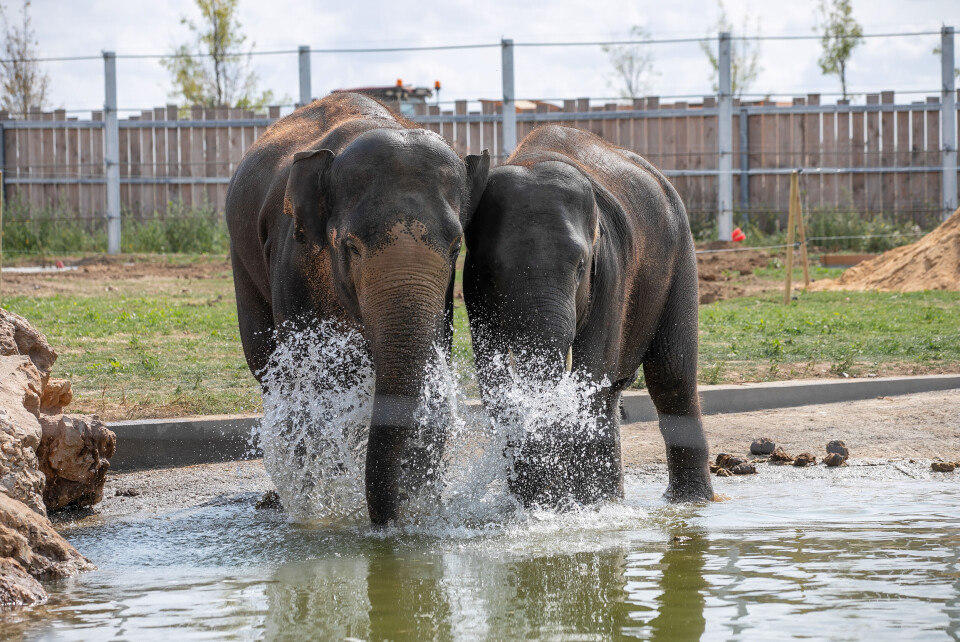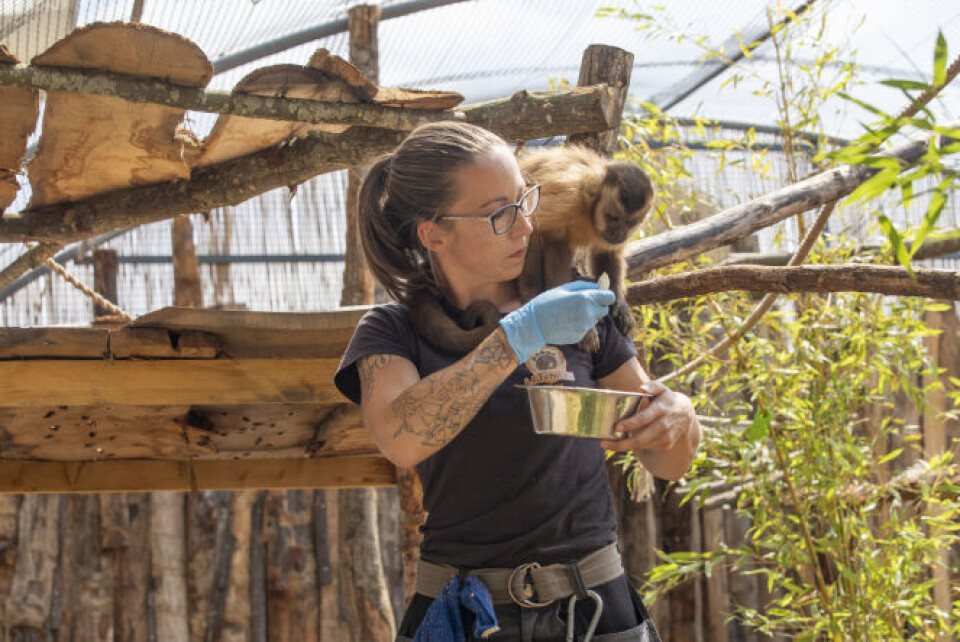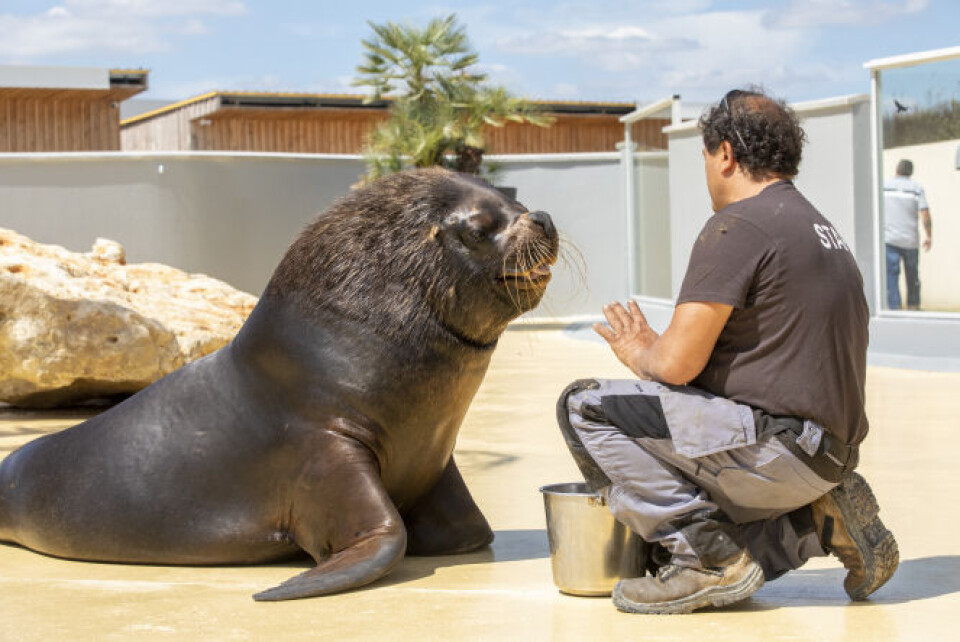-
Hungry, peckish, stuffed: 11 French phrases to do with food and eating
These phrases help to talk about one of the most important subjects in France - food
-
Rugby vocabulary to know if watching the Six Nations in France
From un tampon to une cathédrale, understand the meaning of key French rugby terms
-
Duck Cold! Four French phrases to use when it is freezing outside
We remind you of French expressions to use to describe the drop in temperature
Confiscated or rescued wild animals find new home at unique French zoo
Unwanted male elephants, retired circus tigers, lab animals and many other exotic creatures are among the animals found there

A petting farm for children has expanded to house unwanted zoo and circus animals, as well as those confiscated by the authorities or rescued from laboratories.
Zoo La Tanière, based near Chartres, in northern France, was founded by Patrick and Francine Violas as a refuge for farm animals and set up using their own savings.
However, as they understood the scale of the demand, they realised that it was not only farm animals that needed rescuing, and the project expanded, said sanctuary spokeswoman Sophie Fernandes-Petitot.
The petting farm, with sheep, goats, a donkey, pony and farmyard birds, still exists, but the zoo is also now home to around 600 wild animals of some 50 different species.
It has already rescued 1,200 animals, rehoming many of them with other animal refuges.
“We have a lot of exotic birds and small monkeys. It usually takes visitors half a day to see everything,” says Ms Fernandes-Petitot.
The animals often come via the French authorities, which confiscate wild animals when they are illegally imported or kept, or mistreated.
Read more: French animal protection law ‘inspired’ by UK
Approximately 10% of the zoo’s inhabitants come from laboratories around the EU.
“Lab animals include primates and cows, and we are currently expecting to take delivery of 250 rabbits, which we are going to put up for private adoption with families once we have checked they are in good health.”
Other animals arrive because their owners have died or can no longer afford to keep them. “We do not take reptiles or domestic pets. There are already plenty of other charities doing that. However, we accept zoo animals which are too old or ill or disabled to be kept.
“Keeping animals like this is expensive, but we do not count the cost. We are not a commercial organisation,” says Ms Fernandes-Petitot.
“Obviously, the money raised from selling tickets to the zoo pays to keep it running, but there is no imperative to make a profit.”
The zoo is spread over 20 hectares, 14 of which are open to the public. The rest are either under construction or ‘backstage’ areas, including the veterinary clinic, quarantine quarters, food stores, supplies, workshops, offices and staff facilities.

The opening of the zoo was delayed by the pandemic, but last summer it attracted good visitor numbers, despite having to juggle various restrictions.Only two animals in the zoo are not rescued – a pair of young, male Asian elephants. Most parks do not take male elephants because they can be so unpredictable.
Unlike the other animals, the elephants do not belong to the zoo.
“Once they become sexually mature, they will leave us and join the European breeding programme,” says Ms Fernandes-Petitot.
All the elephants in Europe are on a register, and breeding is done very carefully to maintain the best possible genetic diversity. The aim is to be able to send males back to Asia.
The zoo has space for four male elephants and the facilities to separate them, if necessary.
This is often the case during a bull elephant’s ‘musth’. From around 12 years old, males periodically go into musth, during which their testosterone levels increase by up to 60% and they become violent and dangerous. Musth elephants have been known to kill other elephants and even their own calves. They will attack keepers and other animals and must be kept isolated until their musth passes. Musth is not always associated with breeding.
Unlike other parks, because the zoo accepts only rescue animals, they do not have a plan for their collection.
“We do not know in advance which animals we will have.
“We sterilise all of them when they arrive, unless they are an endangered species, in which case we will give them contraception.
“The only time any of our animals have young is when a female arrives already pregnant.”
Read more: Upgrade for Strasbourg zoo but the welfare debate continues
As well as numerous small primates, the zoo has lions, tigers, leopards, bears and sea lions. There is a large aviary for parrots and other exotic birds, which visitors can walk through, and the zoo also has bison, wallabies, baboons and storks.
“In France, travelling circuses are being banned from keeping wild animals, so we are already getting offers of wild cats, camels and monkeys.”
Circus animals need very secure quarters and experienced keepers because they are often psychologically damaged, says Ms Fernandes-Petitot.
“We have two ex-circus workers here who understand their needs, plus vets and specialised keepers.
“We practise medical training, meaning we train them to accept care.
“We can take weekly blood samples from our tigers, for example, without having to anaesthetise them. They are used to going into the crate, used to having their tails handled.
“It takes just 15 minutes, and they remain quite calm during the process, knowing they will get a food treat at the end.”

La Tanière aims to develop a teaching strand in future.
“We already try to teach visiting classes how not to care for animals.
“We explain very clearly how our animals arrived here. Some of their stories are quite sad: we explain about laboratories, traffickers, exotic birds found in a house, lions growing up disabled because they were de-clawed as cubs to be used for photos, so now they limp.
“We just hope that if we educate children, they will not do those things as adults,” says Ms Fernandes-Petitot.
The zoo is open at weekends during January, and every day from the February school holidays through to autumn. For further information, see lataniere-zoorefuge.fr.
Related articles:
Europe's only elephant sanctuary in France welcomes first resident
Petition condemns decision to shoot puma on loose in north France
























